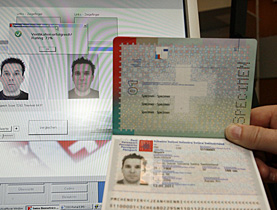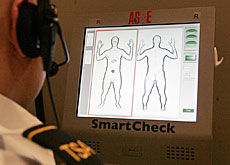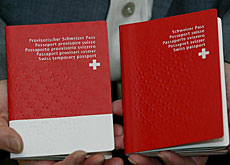Safety concerns mark campaign on new passports

The campaign over the introduction of electronic passports for Swiss citizens next year is gathering pace ahead of a nationwide vote on May 17.
The justice ministry argues that documents containing biometric details help prevent abuses and facilitate travel abroad. But opponents are critical of the planned central database and want citizens to have a choice between new-style and conventional passports.
The biometric passports include an electronic chip that stores two fingerprints and an image of the holder’s face, and these details will be kept in a central database.
Parliament approved a law last year setting out the legal basis for such travel documents in line with regulations by the European Union.
But a committee including representatives of a broad political spectrum collected enough signatures to force a referendum.
Politicians from the centre-left have raised data protection issues and point to a scandal that rocked Switzerland 20 years ago.
“It emerged in 1989 that police had compiled files on about 900,000 citizens and organisations,” says Margret Kiener Nellen, a parliamentarian for the Social Democratic Party.
History shows that the state is prone to breaching the privacy of citizens from time to time, according to Kiener. She points to a case in Basel last year when local police set up a database that included politicians of Kurdish descent.
Data protection
The committee also warned of the risks posed by a central database containing fingerprints.
“It is not acceptable to store the details of Swiss citizens in a central register. Citizens must not be treated like criminals,” said Social Democrat Carlo Sommaruga at a news conference on Thursday.
Green parliamentarian Daniel Vischer added that the Swiss government was going a step beyond the requirements of the EU in setting up a central database.
He argued that the freedom to travel abroad would not be limited if Swiss voters refused to accept the legal amendment in May, saying the government would have enough time to negotiate an alternative solution with Brussels before March 2010.
Opponents say most Swiss do not need an electronic passport, since an identity card is sufficient for trips within the Schengen zone in Europe, where internal border controls have been abolished.
Nor would strict security would be eased for holders of biometric passports wishing to travel to the United States, according to centre-left campaigners.
Another committee led by rightwing politicians is against the new passports because they see the law as an imposition on Switzerland by the EU and Washington.
Preventive
Justice Minister Eveline Widmer-Schlumpf defends biometric passports as a way to prevent abuses.
“It will become more difficult to operate illegally with a passport of another person or a stolen document,” she said at the launch of the vote campaign earlier this week.
Modern technology can protect the passports as well as the data stored on an electronic chip against forgery and abuse,” said Roman Vanek of the Federal Police Office.
The setting up of a central register including fingerprints allows the authorities to minimise the risk of applicants trying to obtain a Swiss passport under false identity.
“The storage of fingerprints is an important preventive measure,” the justice minister said.
Widmer-Schlumpf added that a central database is more reliable and efficient than a multitude of decentralised systems in the 26 cantons and registers kept by about 2,700 local authorities.
She pointed out that biometric passports would help speed up the procedure to obtain passports, in particular in cases of emergency abroad. The costs for applicants and their families would be kept low, she pledged.

More
Referendum
Limited access
About 13,000 passports are reported lost every year, according to officials. Switzerland has issued a total of 3.9 million passports since 2003.
More than 50, mainly industrialised countries, have already introduced biometric passports. The figure is to reach 90 by the end of the year.
Widmer-Schlumpf rejected claims that computer hackers would sooner or later be able to break into the central database and steal confidential information.
She also rejected fears that police would use the data for purposes other than issuing travel documents.
“Only a very restricted number of people have access to the registry. The law says the data must not be used for criminal investigations,” she said.
The new travel documents are a requirement of a European treaty, known as Schengen agreement that became operational in Switzerland in December 2008.
swissinfo, Urs Geiser
Biometric passports are not the only issue up for nationwide vote on May 17.
Voters will also decide on a proposal to include alternative medicine in a list of services paid for by health insurance companies.
As a rule nationwide ballots take place four times a year.
In February, voters approved a continuation and extension of a key labour accord with EU.
Biometrics is the science of measuring an individual’s physical properties.
Biometric systems recognise features such as a fingerprint, iris patterns, ear shape, and vein structure.
A person’s biometric data can be compared with the information contained in the passport for verification purposes.

In compliance with the JTI standards
More: SWI swissinfo.ch certified by the Journalism Trust Initiative





You can find an overview of ongoing debates with our journalists here. Please join us!
If you want to start a conversation about a topic raised in this article or want to report factual errors, email us at english@swissinfo.ch.